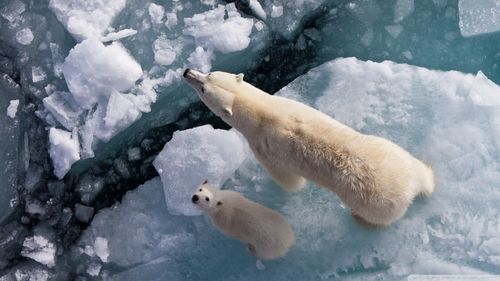Climate Change Weekly #45
The polar bear population along the western shore of Hudson Bay, Canada is substantially larger than what had been predicted by global warming alarmists, the Canadian government reported after conducting an aerial survey of the region.
Government scientists estimate the polar bear population along the western shore of Hudson Bay now stands at approximately 1,013 bears, a population 40 percent greater than what had been forecast by Environment Canada.
In 2004, Environment Canada estimated 935 polar bears lived along the western shore of Hudson Bay. Environment Canada forecasted the number would fall to 610 by 2011.
The updated count shows “the bear population is not in crisis as people believed,” said Drikus Gissing, director of wildlife management for Canada’s Nunavut Territory. “There is no doom and gloom.
Scientists consider western Hudson Bay to be one of the most important polar bear regions in the world. Gissing said the polar bear population is strong beyond Hudson Bay, as well, with 25,000 bears populating the Canadian Arctic.
“That’s likely the highest [population level] there has ever been,” said Gissing.
SOURCE: UK Globe and Mail
IN THIS ISSUE
Global sea ice exceeds 1979–2008 mean … European Space Agency misrepresents Antarctic sea ice … Satellite data show warming remains modest … Study shows corals benefited from more CO2 … Tropical forests are benefiting from elevated CO2 … Elderly Brit forced to change doctors due to her carbon footprint
GLOBAL SEA ICE EXCEEDS 1979–2008 MEAN
Global sea ice exceeds the 1979–2008 mean, according to the latest satellite measurements, contradicting assertions that global warming is causing a rapid and inexorable decline in polar sea ice. Northern Hemisphere sea ice is close to the 1979–2008 mean, while Southern Hemisphere sea ice remains above the 1979–2008 mean.
SOURCE: Cryosphere Today
EUROPEAN SPACE AGENCY MISREPRESENTS ANTARCTIC SEA ICE
The European Space Agency has issued a press release claiming “the rapid retreat of one of Antarctica’s ice shelves [is] due to climate warming.” The press release claims the Larson B ice shelf has lost significant ice during the past decade and such ice loss is consistent with “climatic models predicting drastic warming for high latitudes.” The press release fails to mention, however, that Antarctic sea ice as a whole has been expanding for decades.
SOURCES: Watts Up With That? and Cryosphere Today
SATELLITE DATA SHOW WARMING REMAINS MODEST
Global temperatures for the month of March were merely 0.11 degrees above the 30-year average, extending the decade-long pause in global warming. Global temperature readings show the relatively warm North American winter has been a global aberration.
SOURCE: Dr. Roy Spencer
STUDY SHOWS CORALS BENEFITED FROM MORE CO2
Corals exposed to elevated levels of carbon dioxide were able to adapt to lower pH and improved their calcification and growth rates over a period of several months, reports a newly published paper in the peer-reviewed Global Change Biology. The study confirms the results of prior studies showing a decline in calcification during the initial week of exposure to elevated carbon dioxide. However, the corals were “capable to acclimate to acidified conditions in long-term (6 months) incubations, leading to even slightly enhanced rates of calcification,” the study reports.
SOURCES: World Climate Report and Global Change Biology
TROPICAL FORESTS ARE BENEFITING FROM ELEVATED CO2
Newly published papers in Landscape Ecology and Trees report tropical forests are benefiting from elevated amounts of atmospheric carbon dioxide. The Landscape Ecology paper reports rainforests in Australia are expanding, largely due to the increase in precipitation that has accompanied global warming. The Trees paper reports forests in arid portions of Mexico are increasing their water efficiency as atmospheric carbon dioxide levels rise.
SOURCE: World Climate Report
ELDERLY BRIT FORCED TO CHANGE DOCTORS DUE TO HER CARBON FOOTPRINT
An 83-year-old woman in England has been told she emits too much carbon dioxide in her two-mile trip to her doctor’s office and she therefore must find a new doctor. The woman had been a patient with the same doctor’s office for 30 years.
SOURCE: UK Telegraph





